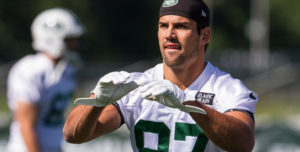By Rich Cimini
Trust your eyes.
It’s an old scouting axiom, one that came into play when the New York Jets evaluated Eric Decker in preparation for free agency. They had to trust their eyes because too often in professional football — other sports, too, for that matter — teams fall in love with players for the wrong reasons. In Decker’s case, the wrong reason would’ve been last season’s numbers — 87 receptions for 1,288 yards. They jump off the page, but as Jets receivers coach Sanjay Lal said, “You’re not signing the stats.”
Decker played in the most prolific passing offense in history, directed by one of the greatest quarterbacks in history, Peyton Manning. An average receiver could’ve posted decent numbers in that situation, and the Jets most definitely didn’t want to sign an average receiver. So they went to the tape, conducting an in-depth study on Decker’s game.
Lal said he evaluated Decker in three primary areas: How he separated at the top of his routes, his ability to beat press coverage and whether he was able to put vertical pressure on defensive backs.
“Eric did all of those things,” Lal said. “You take those things, with a lot of weapons around you and a great quarterback, then you get 80 catches for 1,200 yards. But you’re signing the ability to get open. He might have less than 80 catches this year and still be as productive for our offense.”
Watch: Jets’ WRs coach Sanjay Lal breaks down Eric Decker tape
In his tape study of Decker, Lal noticed the subtle strengths in his game, the stuff the average fan wouldn’t detect. For instance, he was impressed by the different ways he was able to shed a cornerback on his hip. Sometimes, he did it by leaning on the defender, sometimes he did it by changing his pace.
“He always had something in his back pocket to get loose,” Lal said.
Decker wasn’t a born receiver. In fact, he played running back until his sophomore year in high school. His coach put him on the outside and he fell in love with the nuances of the position, the challenge of trying to outsmart a defensive back who has studied his every move on tape — and vice versa. He calls it a chess game. In a way, it’s like poker. A good receiver, like a card player, has no “tells” — a head bob, a shoulder dip, any small movement that will tip his route.
“I feel like it’s one of my best qualities, route-running ability,” Decker said. “I’ve always tried to work on making sure everything looks the same, so I don’t tip off DBs as far as what routes I’m going to run.”
To continue reading the article visit ESPN.com











